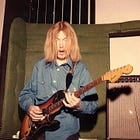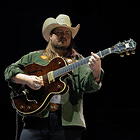I need you to round it all up and send it in some sort of direction
Excerpt from Play All Night! Duane Allman and the Journey to Fillmore East
[NB: Edit of my annual Gregg birthday post]
Gregory Lenoir Allman was born December 8, 1947 in Nashville, Tennessee.
In honor of Gregg’s birthday, here’s an excerpt from Chapter 7 of Play All Night! Duane Allman and the Journey to Fillmore East
The Birth of the Allman Brothers Band
On March 23, 1969, after several months playing in jams around Jacksonville, Duane, Jaimoe, Berry, Dickey, and Butch, with Reese Wynans on keyboards, convened to play in an impromptu session that birthed that the Allman Brothers Band. The band set up at Oakley’s house at 2844 Riverside Avenue.
“We whipped into a little jam,” Duane said. “And the jam lasted two and a half hours. When we finally quit, nobody even said a word, man, everybody was speechless.”
Jaimoe said, “The spirits met and that was it.”
“It was like being born again, a revival meeting,” said Butch. “I had felt that before playing symphonic music, but this was the first time I’d ever really felt it playing a set of drums, playing rock ’n’ roll.”
Duane knew this lineup was remarkable. “It really frightened the shit out of everybody,” he said. “Right then I knew, I said ‘Man, here it is, here it is!”
Butch said, “It was pretty obvious what was working. It was this particular group of people who all had the same philosophy. Different musical backgrounds, but what we were looking for at that time was that note.”
The band created music spontaneously, complementing the soloists on their improvisational forays.
It was also made to be played live.
“We knew that the band was something special.” Dickey said. But it lacked one crucial element: “Nobody really sang as good as the band could play.”
Help soon came from Duane’s original collaborator
Though the brothers were somewhat estranged following Gregg’s return to L.A. after the 31st of February sessions1 the previous September, Duane always intended to enlist Gregg in his new project.
Linda Oakley remembered Duane looking out for his younger brother when he first arrived in Jacksonville that March. “We’ve got to get my brother here, out of that bad situation [in L.A.]. He’s a great singer and songwriter and he’s the guy who can finish this thing.”
“There was never a doubt that Gregg would be the singer,” said Jaimoe.
After the jam session on March 23, Duane called Gregg in California. “We got it shaking down here and all we need is you,” Duane said.
“The cats love to play. They’re all really into their instruments, they sing a little bit but there’s not a whole lot of writing going on so I need you to come and sing and write and round it all up and send it in some sort of direction.”
Gregg long called it “the finest compliment I ever had.”
Since he returned to California to fulfill Hour Glass’s contractual obligations, Gregg had recorded and released just one single for Liberty, a cover of Tammy Wynette’s “D-I-V-O-R-C-E” released as “Greg Allman & The Hour Glass.” Billboard found “a solid blues feel via [a] soulful and dynamic treatment. Much pop and R&B appeal.” Gregg called it “sellout bullshit.”
Gregg fled L.A. for Florida post-haste.
A great blues singer. A great singer, period.
In addition to playing keyboards, he provided the final two ingredients of new band: vocals and songwriting. The former was a well-known weapon in Gregg’s arsenal. “Duane could see Gregg’s talent long before he saw it in himself,” their mother, Geraldine Allman, reflected.
Though he would never develop into a songwriter, Duane knew his brother would. “His stuff don’t need much improvement,” he said of Gregg. “From the start, his stuff’s pretty goddamn good.”
Gregg brought to the mix the vocal influences of R&B stars such as Bobby Bland, Ray Charles, Muddy Waters, and his favorite, James “Little Milton” Campbell. Gregg’s ability to channel these gifted vocalists impressed Jaimoe immediately.
“I played with Otis Redding and Percy Sledge and saw Ray Charles and B.B. King and every other great and I’ll tell you this: there’s not anybody I ever heard who sang with more truth and passion than Gregory. He was at the very top. And that shit about him being one of the great ‘white blues singers’ is straight bullshit. He’s a great blues singer. A great singer, period.”
In Los Angeles without Duane, Gregg had sharpened his songwriting talents. John McEuen called a demo of “It’s Not My Cross to Bear” “the sound of Gregg really finding himself.”
Gregg explained, “I didn’t want to be a jukebox anymore, so I kept writing. . . . I was sick of learning parts and making sure they were right.” Singer-songwriters Tim Buckley, Stephen Stills, and Jackson Browne offered additional possibilities. “All I had known was R&B and blues,” Gregg said. “These guys turned me on to a more folk-oriented approach.”2
Jaimoe appreciated the results. “Gregory’s music and singing were based on rhythm and blues and blues he said, but his songwriting was so influenced by people like Bob Dylan and Jackson Browne and other people who wrote poem songs. What made him so unique is the way he combined those things.”
You had no choice but to be very good at what you were doing
Gregg arrived into a pressure-packed situation in Jacksonville. It was a band of top-flight musicians. “You had no choice but to be very good at what you were doing,” Jaimoe noted, “because it was a reflection of what you were hearing and everyone around us was so good.”
On March 26, 1969, Gregg stepped into his first band rehearsal.
“Jesus Christ, what a band!” he said.
“It just knocked me out.” He fit right in as band revved up its cover of Muddy Waters’s “Trouble No More.”
“His voice and his lyrics were like two more instruments,” Jaimoe recalled.
Gregg was the final piece of the puzzle, just as Duane planned. Gregg’s arrival completed the lineup, and Duane had finally found the creative outlet and originality he’d long sought.
It made a believer out of Jaimoe, who until he joined forces with the Allman Brothers believed white musicians merely mimicked great Black musicians. “They never allowed themselves to come through,” he said.
In Jacksonville with the Allman Brothers, Jaimoe learned otherwise. “Gregg sounded great,” the drummer said, “but he sounded like himself. He had that right from the first day I met him.”
Black musicians chastised Jaimoe for playing with the ABB. “Jai Johanny, what are you doing with these white boys? Why are you in a rock ’n’ roll band?” they would ask. “Those motherfuckers can play!” he responded.
We never talked about what we were doing or told each other what to do. Everyone just played.
“In the beginning it was so amazing I don’t even know how to put it into words,” said Betts. “We all knew we were on to something special because we’d been putting bands together for years at that point.”
Gregg brought the picture into sharp focus.
Former bandmate Paul Hornsby noticed the difference. “I don’t know how it could have been any better or anybody else they could have chosen that could’ve done a better job,” he said. “You had six people that were just out there just slaying it. Duane is part of it and it’s a unit. It’s not just a lead guitar player out front, it’s not just a lead singer. This whole thing was just one big glob of power.”
For Duane and his mates, the band was the fulfillment of a long quest. “When the six of us got together,” Jaimoe recalled, “we became what we were looking for and who we were looking for and it was clear as a bell. It was just a great bunch of guys playing and it was just so natural. We never talked about what we were doing or told each other what to do. Everyone just played.”
The new band played a mélange of southern musical flavors with a contemporary rock music flair.
It was, said Jaimoe, “American music.”
EXCERPTED FROM Play All Night! Duane Allman and the Journey to Fillmore East
Thanks for reading, y’all. It’s good to have you here.
If you liked this post, please share it with at least one person by clicking this button:








